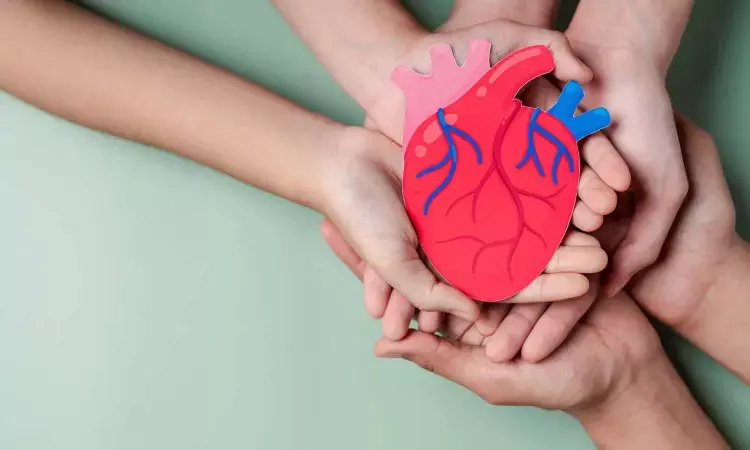- Home
- Medical news & Guidelines
- Anesthesiology
- Cardiology and CTVS
- Critical Care
- Dentistry
- Dermatology
- Diabetes and Endocrinology
- ENT
- Gastroenterology
- Medicine
- Nephrology
- Neurology
- Obstretics-Gynaecology
- Oncology
- Ophthalmology
- Orthopaedics
- Pediatrics-Neonatology
- Psychiatry
- Pulmonology
- Radiology
- Surgery
- Urology
- Laboratory Medicine
- Diet
- Nursing
- Paramedical
- Physiotherapy
- Health news
- Fact Check
- Bone Health Fact Check
- Brain Health Fact Check
- Cancer Related Fact Check
- Child Care Fact Check
- Dental and oral health fact check
- Diabetes and metabolic health fact check
- Diet and Nutrition Fact Check
- Eye and ENT Care Fact Check
- Fitness fact check
- Gut health fact check
- Heart health fact check
- Kidney health fact check
- Medical education fact check
- Men's health fact check
- Respiratory fact check
- Skin and hair care fact check
- Vaccine and Immunization fact check
- Women's health fact check
- AYUSH
- State News
- Andaman and Nicobar Islands
- Andhra Pradesh
- Arunachal Pradesh
- Assam
- Bihar
- Chandigarh
- Chattisgarh
- Dadra and Nagar Haveli
- Daman and Diu
- Delhi
- Goa
- Gujarat
- Haryana
- Himachal Pradesh
- Jammu & Kashmir
- Jharkhand
- Karnataka
- Kerala
- Ladakh
- Lakshadweep
- Madhya Pradesh
- Maharashtra
- Manipur
- Meghalaya
- Mizoram
- Nagaland
- Odisha
- Puducherry
- Punjab
- Rajasthan
- Sikkim
- Tamil Nadu
- Telangana
- Tripura
- Uttar Pradesh
- Uttrakhand
- West Bengal
- Medical Education
- Industry
Sclerostin: A key protein for cardiovascular health in patients with type 2 diabetes

Type 2 diabetes (T2D) is a growing concern as the metabolic disorder is associated with an increased risk of cardiovascular disease (CVD) affecting approximately 35% of T2D patients. The major CVDs associated with T2D include ischemic heart disease, coronary artery disease, and peripheral artery disease.
A study in Cardiovascular Diabetology carried out by the MP20-Biomarkers of Metabolic and Bone Diseases research group at the Biohealth Research Institute in Granada (ibs.GRANADA), led by UGR Professor Manuel Muñoz Torres, has provided significant insights into the role of sclerostin in protecting against atherosclerosis in patients with type 2 diabetes.
Sclerostin, commonly associated with the regulation of bone formation, has emerged as a protective factor in vascular health, especially in individuals with type 2 diabetes. Atherosclerosis, a common complication of this disease, involves the deposition of substances such as cholesterol and fats in the arteries, resulting in the formation of plaques that can reduce blood flow and increase the risk of serious cardiovascular diseases.
The study, led by Professor Manuel Muñoz Torres, together with Dr Beatriz García Fontana and Dr Cristina García Fontana, included 121 controls and 139 patients with type 2 diabetes (48 with cardiovascular disease and 91 without). The results showed significantly higher levels of sclerostin in patients with type 2 diabetes and cardiovascular disease, suggesting a possible link between this protein and atherosclerosis. Sclerostin was also shown to play a beneficial role in reducing arterial calcification, which is associated with the development of atherosclerosis.
The group of scientists from ibs.GRANADA, the “San Cecilio” University Hospital in Granada, the Centre for Networked Biomedical Research on Frailty and Healthy Ageing (CIBERFES) of the “Carlos III” Health Institute, as well as the UGR, carried out in vitro experiments on vascular smooth muscle cells, replicating pathophysiological conditions of patients with type 2 diabetes. They found that sclerostin overexpression reduced calcium deposits, decreased cell proliferation and inflammation, and promoted cell survival.
The results, part of researcher Sheila González Salvatierra’s doctoral thesis, raise concerns about the use of anti-sclerostin antibody treatments in patients with type 2 diabetes, as blocking sclerostin activity may increase cardiovascular risk. This discovery highlights the importance of following regulatory guidelines when prescribing these medications, which are contraindicated in people with high cardiovascular risk.
Researchers concluded that "Sclerostin could play a protective role in the development of atherosclerosis in T2D patients by reducing calcium deposits, decreasing proliferation and inflammation, and promoting cell survival in VSMCs under calcifying conditions. Therefore, considering the bone-vascular axis, treatment with anti-sclerostin for bone disease should be used with caution."
The authors of the study noted the clinical relevance of these findings, which have the potential to significantly impact therapeutic strategies for patients with type 2 diabetes and cardiovascular disease.
Reference:
González-Salvatierra, S., García-Fontana, C., Lacal, J. et al. Cardioprotective function of sclerostin by reducing calcium deposition, proliferation, and apoptosis in human vascular smooth muscle cells. Cardiovasc Diabetol 22, 301 (2023). https://doi.org/10.1186/s12933-023-02043-8.
MSc. Neuroscience
Niveditha Subramani a MSc. Neuroscience (Faculty of Medicine) graduate from University of Madras, Chennai. Ambitious in Neuro research having worked in motor diseases and neuron apoptosis is interested in more of new upcoming research and their advancement in field of medicine. She has an engrossed skill towards writing and her roles at Medical dialogue include Sr. Content writer. Her news covers new discoveries and updates in field of medicine. She can be reached at editorial@medicaldialogues.in
Dr Kamal Kant Kohli-MBBS, DTCD- a chest specialist with more than 30 years of practice and a flair for writing clinical articles, Dr Kamal Kant Kohli joined Medical Dialogues as a Chief Editor of Medical News. Besides writing articles, as an editor, he proofreads and verifies all the medical content published on Medical Dialogues including those coming from journals, studies,medical conferences,guidelines etc. Email: drkohli@medicaldialogues.in. Contact no. 011-43720751


